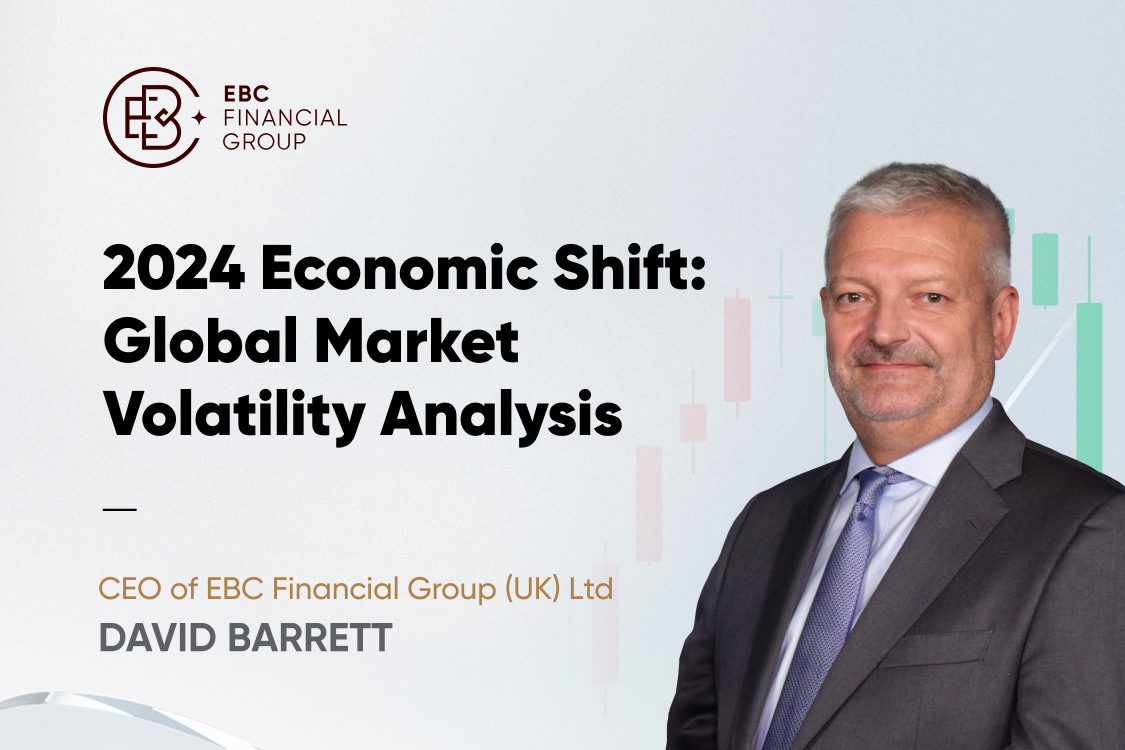LONDON, Aug. 27, 2024 (GLOBE NEWSWIRE) -- Global markets are in a state of flux as inflationary pressures, shifting interest rate policies, and geopolitical tensions converge to create unprecedented uncertainty across financial sectors. David Barrett, CEO of EBC Financial Group (UK) Ltd and EBC Financial Group (Cayman) Limited, offers his expert analysis on the forces driving today’s financial landscape and the strategies investors must employ to stay ahead.

STOCK MARKET VOLATILITY AND SHIFTING INTEREST RATE EXPECTATIONS CREATE AN UNCERTAIN ECONOMIC LANDSCAPE
Barrett highlighted a period of renewed confidence in cash equity trading during the first half of 2024. At that time, both institutional and retail investors were driving a surge in activity, enhancing market liquidity and efficiency. Positive earnings reports and improving economic indicators supported this momentum, indicating a healthier investment climate.
Global markets have recently experienced significant turbulence, triggered by multiple factors, including Japan's unexpected interest rate hike, inflationary concerns, and the Federal Reserve’s decision to maintain high interest rates despite signs of slowing economic growth. At their July 2024 meeting, the Fed chose to keep rates steady at their 23-year-high of 5.25%-5.50%, surprising some market participants who had hoped for signals of easing monetary policy.
Barrett had previously challenged the misconception that low interest rates represented a new standard, emphasizing that these rates were driven by extraordinary circumstances, such as the COVID-19 pandemic. He cautioned that while low rates provided short-term relief, they were never intended to be permanent. The recent decisions by central banks to maintain higher rates reflect a broader shift away from the era of cheap money, as policymakers continue to grapple with persistent inflation.
While the Federal Reserve’s actions align with its goal of controlling inflation, they also sparked fears that maintaining high rates during an economic slowdown could push the economy into a recession. Investors, who had anticipated potential rate cuts to ease economic pressure, reacted by selling off stocks, amplifying the market downturn. This response highlights the delicate balance central banks must navigate between managing inflation and supporting economic growth.
Barrett advises that investors should be prepared for continued volatility, as central banks may need to adjust monetary policy in response to evolving economic conditions. Strategic flexibility is essential, as the potential for higher rates to persist in the medium term remains uncertain. Despite these challenges, Barrett notes that opportunities in cash equity trading remain, though navigating this environment will require careful strategy and a long-term focus on stability.
CORPORATE STRENGTH AND GOVERNMENT SUPPORT DRIVE U.S. ECONOMIC STABILITY
Barrett highlights the vital role U.S. corporations and government interventions continue to play in maintaining economic stability, especially amid growing political and economic shifts. The volatility in early August 2024 was a stress test, but new developments—particularly in the political landscape—are shaping the market outlook further.
Kamala Harris’ entrance into the 2024 presidential race has drawn attention to a new wave of policies aimed at addressing cost-of-living challenges, including corporate crackdowns and substantial tax incentives for housing. Her proposals, such as $25,000 for first-time home buyers and higher child benefits, have captured the attention of middle-class voters in key swing states. However, Barrett points out that while these measures are politically appealing, they come with potential economic trade-offs. Increased spending on housing and higher disposable incomes could stimulate short-term economic growth but may also fuel inflationary pressures.
Barret notes that markets are closely watching for policy signals from the Federal Reserve, as concerns over inflation persist alongside signs of slowing economic growth. While some data points have been stronger than expected, the overarching concern remains how central banks will balance inflation control with the risk of slowing the economy too much. As election rhetoric ramps up, short-term promises designed to attract voters could lead to more critical assessments of their long-term impacts, particularly for large corporations.
Barrett advises that while corporate strength and government support have helped stabilise the economy so far, investors should be mindful of broader political and economic shifts on the horizon. These include inflation risks, potential changes in fiscal policies from both sides of the political spectrum, and shifts in the Federal Reserve’s monetary stance. Understanding the intersection of political promises and economic reality will be key to navigating the coming months.
GOLD HOLDS STEADY AS A KEY INVESTMENT IN UNPREDICTABLE MARKETS
David stresses that despite ongoing global uncertainties, gold remains a reliable investment choice. As geopolitical tensions and economic challenges persist in 2024—such as inflationary concerns, fluctuating interest rates, and the prospect of U.S. interest rate cuts—gold’s role as a safe-haven asset continues to hold firm.
Earlier in 2024, the U.S. dollar maintained significant strength due to persistent inflation and the Federal Reserve’s aggressive rate hikes. However, as expectations of rate cuts increase, the dollar has softened amid concerns over U.S. economic growth. This weakening dollar has supported gold prices, making gold more attractive to international investors. As a result, gold has climbed to near all-time highs, surpassing $2,500 per ounce in August 2024—a nearly 20% gain over the past year.
Barrett emphasises that in an environment of economic unpredictability, gold offers a buffer against the risks of inflation and potential policy shifts. As the U.S. election approaches and global market conditions remain uncertain, gold’s enduring stability makes it a critical element of a diversified portfolio, particularly for investors seeking to hedge against ongoing volatility.
DOLLAR-YEN CURRENCY PAIR CONTINUES TO FLUCTUATE AMID RENEWED FX MARKET VOLATILITY
Barrett highlights that the dollar-yen currency pair has been subject to sustained volatility, especially as global markets have experienced renewed turbulence since June 2024. Earlier calm in the FX market gave way to sharp fluctuations in August, driven by concerns over inflation and the Federal Reserve’s decision to maintain historically high interest rates. The divergence in monetary policies between the U.S. and Japan remains a central factor, with the Federal Reserve holding rates high to counter inflation while the Bank of Japan continues its ultra-loose policy stance.
The market upheaval around early August 2024 amplified these fluctuations, particularly as fears of prolonged high rates and global economic uncertainty sent ripples across financial markets. The dollar-yen pair has been at the forefront of these movements, serving as a critical barometer for investor sentiment and risk appetite in an increasingly unstable economic environment.
Barrett underscores that the ongoing volatility in the dollar-yen pair offers valuable insights into broader macroeconomic shifts and the delicate balance central banks must strike between inflation management and economic growth. As the market grapples with these complex dynamics, the dollar-yen's movements continue to be a key indicator of international financial stability.
DECLINE IN RETAIL TRADING ACTIVITY SLOWS CARRY TRADES AND DAMPENS FX MARKET
Barrett notes that the FX market, particularly in the realm of retail trading, has seen a shift in activity since mid-2024. Earlier in the year, retail participation in FX had already shown signs of decline, influenced by increased market volatility, regulatory pressures, and tightening monetary policies. The events of August 2024, marked by major market volatility and concerns over sustained high interest rates, have further dampened enthusiasm for carry trades—strategies that rely on interest rate differentials between currencies.
The slowdown in retail trading has had a ripple effect on the FX market. Carry trades, which typically benefit from stable, predictable interest rate environments, have become less attractive as the divergence between central banks' policies grows. While the Federal Reserve has maintained high rates to counter inflation, other central banks, like the Bank of Japan, continue to pursue looser monetary policies. This divergence has introduced more uncertainty, making these trades riskier for retail investors.
Barrett emphasises that this reduced engagement from retail traders is reshaping the dynamics of the FX market. While institutional players continue to dominate, the lower retail activity has led to a less vibrant trading environment, particularly in currency pairs that depend on carry trade strategies. Investors must adjust to these changing conditions, recognising that retail-driven market movements may remain subdued as global interest rate policies continue to diverge.
EBC Financial Group’s Strategic Approach
Amid the ongoing market volatility and shifting global economic conditions, EBC Financial Group continues to focus on delivering tailored financial services that help investors navigate this uncertain environment. By prioritising professional market access and operational flexibility, EBC Financial Group remains committed to adapting to both market dynamics and regulatory changes.
Barrett advises investors to remain vigilant in the face of ongoing economic unpredictability. Selecting reputable brokers, staying informed about regulatory shifts, and maintaining adaptability are crucial strategies for success in today's rapidly evolving markets.
About EBC Financial Group
Founded in the esteemed financial district of London, EBC Financial Group (EBC) is renowned for its comprehensive suite of services that includes financial brokerage, asset management, and comprehensive investment solutions. With offices strategically located in prominent financial centres, such as London, Sydney, Hong Kong, Tokyo, Singapore, the Cayman Islands, Bangkok, Limassol, and more, EBC caters to a diverse clientele of retail, professional, and institutional investors worldwide.
Recognised by multiple awards, EBC prides itself on adhering to the leading levels of ethical standards and international regulation. EBC Financial Group (UK) Limited is regulated by the UK's Financial Conduct Authority (FCA), EBC Financial Group (Australia) Pty Ltd is regulated by Australia's Securities and Investments Commission (ASIC), and EBC Financial Group (Cayman) Limited is regulated by the Cayman Islands Monetary Authority (CIMA).
At the core of EBC Group are seasoned professionals with over 30 years of profound experience in major financial institutions, having adeptly navigated through significant economic cycles from the Plaza Accord to the 2015 Swiss franc crisis. EBC champions a culture where integrity, respect, and client asset security are paramount, ensuring that every investor engagement is treated with the utmost seriousness it deserves.
EBC is the Official Foreign Exchange Partner of FC Barcelona, offering specialised services in regions such as Asia, LATAM, the Middle East, Africa, and Oceania. EBC is also a partner of United to Beat Malaria, a campaign of the United Nations Foundation, aiming to improve global health outcomes. Starting February 2024, EBC supports the 'What Economists Really Do' public engagement series by Oxford University's Department of Economics, demystifying economics, and its application to major societal challenges to enhance public understanding and dialogue.
Media Contact:
Chyna Elvina
Southeast Asia Public Relations Manager
chyna.elvina@ebc.com
Douglas Chew
Global Public Relations Lead
douglas.chew@ebc.com
A photo accompanying this announcement is available at https://www.globenewswire.com/NewsRoom/AttachmentNg/de039a63-af41-458e-872e-6e7bf94204fa

source: EBC Financial Group
樂本健【雙11感謝祭】雙重優惠、多買多賞► 了解詳情
































